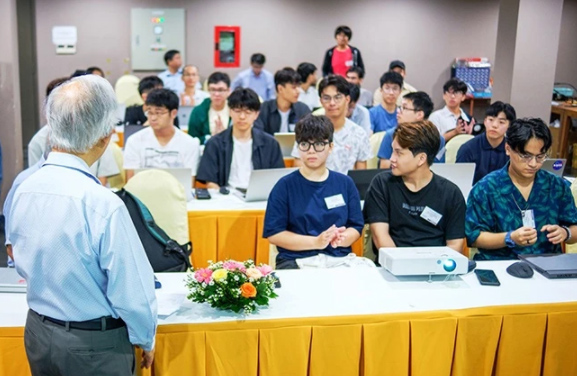Vietnam School on Neutrinos 2024 opens in Quy Nhon
ABO/NDO- The 8th Vietnam School on Neutrinos (VSON) 2024 was opened in the central city of Quy Nhon, the central province of Binh Dinh, on July 16 by the International Centre for Interdisciplinary Science and Education (ICISE).
The event sees the participation of 32 scientists and researchers in the field of Neutrinos physics from Japan, China, India, Italy, the UK, and the host country.
Promient among them are Professor Yuichi Oyama from KEK Institute, Japan; Professor Atsumu Suzuki from Kobe University, Japan; Professor Makoto Miura from ICRR, University of Tokyo, Japan; Professor Jennifer Thomas from University College London, the UK; Professor Sanjib Kumar Agarwalla from Institute of Physics (IOP), Bhubaneswar, India; Professor Junting Huang from Shanghai Jiao Tong University, China; and Professor Tsuyoshi Nakaya from University of Tokyo, Japan.
The week-long event will provide participants with information on physics and neutrino physics, fundamental principles and modern techniques for detecting these particles, current and future neutrino projects, as well as scientific breakthroughs made possible through these experiments.
 |
| The 8th Vietnam School on Neutrinos gather 32 scientists and researchers in the field of Neutrinos physics from Japan, China, India, Italy, the UK, and the host country. (Photo: VNA). |
Moreover, attendees will acquire specific skills such as simulating neutrino interactions, categorising these interactions through imagery from the Super-Kamiokande detector (an experiment which directly contributed to the 2015 Nobel Prize in Physics), and operating a basic cosmic ray measurement system designed by the Neutrino Physics research group at the ICISE.
Speaking at the opening ceremony, Professor Tran Thanh Van, Chairman of the Vietnam Meeting Vietnam Science Association and Director of ICISE, highlighted the growing significance of neutrino physics within the global landscape of basic particle physics research.
First held in 2017 with support from leading neutrino physicists from Japan, the school has garnered a reputation for excellence, attracting participants from Europe, the US, Japan, India, and Southeast Asia.
The Vietnam School on Neutrinos Physic equips its students with valuable, engaging insights into this pivotal branch of contemporary physics, and offering a transformative educational experience that fosters personal and academic growth.
On the same day, the 30th Vietnam School of Physics (VSOP30) was opened at the ICISE with the participation of 34 scientists and researchers from 13 countries and territories.
The event will be devoted to particle physics and dark matter, both theory and experiment. In addition to fundamental knowledge of Quantum Field Theory and the Standard Model (SM), the lectures will cover theories beyond the SM, dark matter, experimental methods for collider searches at the LHC, Monte Carlo methods, and machine learning.
The event brings together numerous researchers from around the world. It aims to connect and guide students who are passionate about physics. The school offers a series of lectures on basic particle physics and theoretical and experimental dark matter.
Particularly, participants will have an opportunity to engage with current research topics being pursued by the lecturers. The lectures build upon fundamental knowledge from undergraduate to advanced levels.
The VSOP 30 is scheduled to conclude on July 26.
The VSOP series of schools originated from a school created in 1994 by Nguyen Van Hieu and Tran Thanh Van and funded by Rencontres du Vietnam. It became an international school in 1995 with the participation of Vietnamese and foreign students. The school is also funded by the Asia Pacific Centre for Theoretical Physics (APCTP), Pohang, the Republic of Korea, as an external activity.
(Source: NDO)
 về đầu trang
về đầu trang







